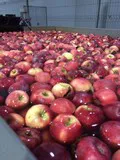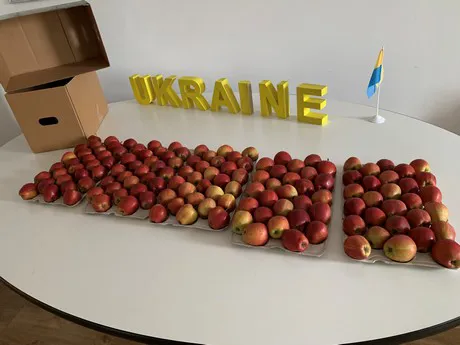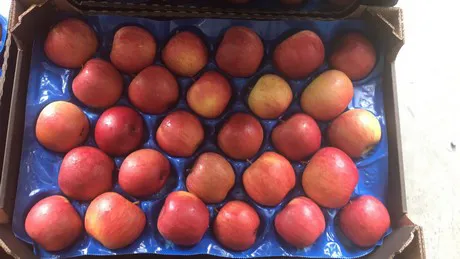The 2018-2019 apple season in Ukraine only has a few weeks left, and the year has offered the Ukrainians exactly what they needed. More experience in the world market and perspective on new markets. For one Ukrainian exporter the focus has been on increasing the quality over quantity.
 Maxim Kulik is the Agro Consultant for Vinaigrette, a fresh fruit and vegetable exporter based in Ukraine. The season 2018-2019 is about to be finished and according to Kulik the season has had its ups and downs: “The season of 2018-2019 was kind of hard on us in terms of pricing, the average price for Class 1 this year will not be less than 33 eurocents per kilo. Maintaining good quality for the apples was a challenge, but up until now this has been successful. We expect to work until the end of April in a systematic way and will be completely finished around the end of May.”
Maxim Kulik is the Agro Consultant for Vinaigrette, a fresh fruit and vegetable exporter based in Ukraine. The season 2018-2019 is about to be finished and according to Kulik the season has had its ups and downs: “The season of 2018-2019 was kind of hard on us in terms of pricing, the average price for Class 1 this year will not be less than 33 eurocents per kilo. Maintaining good quality for the apples was a challenge, but up until now this has been successful. We expect to work until the end of April in a systematic way and will be completely finished around the end of May.”
Ukraine has tried to get to the top quickly by cultivating the five top varieties: “If we’re honest the market mainly wants the top five varieties like Golden, Gala, Fuji, Granny Smith and Red Delicious. We have all of these varieties and exporting them has been going well. However we do see a trend in terms of clone and club varieties like Kiku, Jazz, Pink Lady and so on. The Ukrainian growers have already started producing some of these club and clone varieties, but it will be a little while longer until we’ll have a commercial harvest. We expect to be exporting these varieties in two, maybe three years.” Kulik says.

The Ukrainian apples are historically exported to the Belarusian market, however Vinaigrette has turned to other markets for the most part: “We export about 90 per cent of our volumes to the United Kingdom, Sweden and Holland. The remaining 10 per cent usually reaches Asian countries. Now instead of expanding our volumes as our main focus, we take care of added value first. We do this by trying to ensure all of our produce is branded and can be considered top quality. This way we can try to enter the markets that currently have our attention. We’re thinking about Ireland, Denmark and Norway as we expect”

One of the big apple exporting countries is Poland, who usually make sue of Ukrainian workers. This year they had a bit of trouble though and Kulik says it might have something to do with the improved work environment in Ukraine: “When a farm or company creates all ideal conditions for their workers, like a good salary level, social package and strategy of the company itself, you will never have a lack of workers. This is why we haven’t had any labor issues, nor do we expect to have any in the future. We have had other challenges though. We lacked experience on the world markets and have tried to improve on this part for the past three years. People also didn’t know about the potential of Ukrainian produce, which has since changed. Now they know that ‘Ukraine Can!’” Kulik concludes.
For more information:
Maxim Kulik
Vinaigrette LLC
Tel: +38 0999 100 251
Email: sales@trebyan.com
www.vinigrette.com
